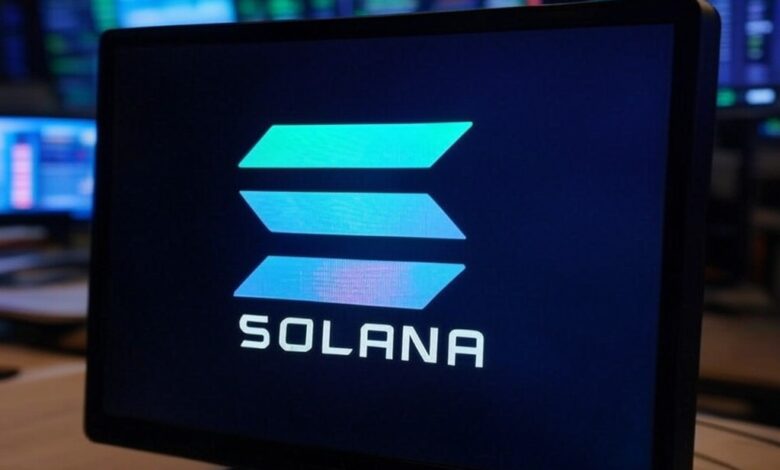First U.S. Solana ETF Launches, Bringing Staking to Mainstream Investors

A new crypto investment vehicle launched Wednesday, giving U.S. investors direct access to Solana (SOLUSD) through traditional brokerage accounts—without needing to hold the token directly. The debut of the REX-Osprey Solana + Staking ETF (SSK) on the Cboe BZX Exchange marks a first-of-its-kind development that could pave the way for a new wave of altcoin-based ETFs.
As reported by Morningstar, some analysts believe this launch opens the door to a broader suite of ETFs focused on smaller digital assets, while others caution that retail investors may bear most of the early risk.
What Makes the U.S. Solana ETF Unique?
The SSK ETF directly invests in Solana, currently the sixth-largest cryptocurrency by market capitalization, and is designed to be accessible through standard investment platforms. Greg King, CEO of REX Financial and Osprey Funds, told reporters that the fund’s early investors are expected to be mostly retail, with institutional participation likely to build over time.
Unlike Bitcoin or Ethereum spot ETFs, which are backed by major players like BlackRock and Fidelity, SSK is the product of a smaller issuer. Still, trading volume hit $20 million by midday on launch day, according to Bloomberg ETF analyst Eric Balchunas, placing it in the top 1% of new ETF launches.
Not Just Another Crypto ETF — Staking Built In
What sets SSK apart is that it’s the first U.S. ETF to offer staking rewards. By locking up its Solana holdings to help secure the network, the fund can generate yield—forecasted around 7.3% annually, according to several staking providers. These rewards are passed on to investors, offering potential passive income.
However, staking also comes with risks, including the potential for network instability or losses if the blockchain is compromised.
Structure and Fees: Higher Than Bitcoin and Ether ETFs
SSK isn’t a pure-play Solana ETF. At least 40% of its assets are allocated to other Solana ETFs, mainly issued outside the U.S., while the rest is held directly in Solana. This diversified structure was filed under the Investment Company Act of 1940, unlike most bitcoin and ether ETFs filed under the Securities Act of 1933.
That structural difference contributes to higher costs. SSK carries a 1.4% total expense ratio, compared to sub-0.25% fees on most bitcoin ETFs. CEO Greg King defended the fee, citing higher compliance costs and the inclusion of staking rewards as justification.
A Changing Regulatory Climate
The approval of the U.S. Solana ETF reflects a broader regulatory shift under the Trump administration, which has adopted a more crypto-friendly stance. Earlier, the SEC under Biden had rejected Solana-based ETFs due to concerns about manipulation and investor protections. Now, regulators appear more open to altcoin products.
This week, the SEC also approved the conversion of Grayscale’s Digital Large Cap Fund (GDLC) into a multi-crypto ETF—its first approval for a fund including assets beyond bitcoin and ether, such as Solana, XRP, and Cardano.
First-Mover Advantage—or a Temporary Head Start?
Despite being first to market, SSK may face stiff competition. At least nine other issuers—including Fidelity, Franklin Templeton, and VanEck—have pending applications for Solana ETFs. Many of these could carry lower fees and simpler structures, giving them an edge once approved.
Roxanna Islam, head of sector and industry research at VettaFi, told Morningstar that while SSK may benefit from early traction, it may also suffer due to higher tax exposure and fund-of-funds complexity, especially if better-priced competitors enter the market.
Will Demand Materialize?
Investor demand remains the biggest unknown. According to Dow Jones Market Data, bitcoin ETFs hold $131.6 billion, while ether ETFs—launched in July 2024—hold only $9.9 billion. Since their respective debuts, bitcoin ETFs have seen inflows of $38.6 billion, versus just $4.2 billion for ether ETFs.
“Bitcoin’s narrative as a store of value is clearer to investors,” said Alex Thorn of Galaxy Digital. “Ethereum and Solana are more about powering smart contracts—useful, but not yet as widely understood as bitcoin’s role in a portfolio.”
The launch of the REX-Osprey Solana + Staking ETF represents a bold step in expanding access to altcoins through regulated markets. With staking rewards, early retail traction, and a unique structure, it sets a precedent—but also raises questions around cost, competition, and long-term viability.
Whether SSK becomes a breakout success or simply a stepping stone toward broader altcoin ETF adoption, it’s a development that investors and issuers alike will be watching closely.





